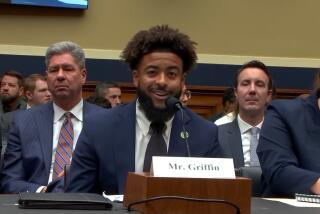Duke Coach Says the Media Paint a Negative Image of College Sports
- Share via
INDIANAPOLIS — Legislators from throughout the country were told Friday that although problems exist in college athletics, they often are sensationalized by the news media, and that government for the most part should keep its nose out of sports.
The media tend to focus on negative aspects, often creating an impression that the entire system is faulty and should be dealt with, if necessary, by legislative action, said Duke University basketball coach Mike Krzyzewski.
“They’re trying to save us from ourselves. They’re saying we’re not capable of making decisions. I think we can become too legislative-conscious,” Krzyzewski said during a panel discussion of college athletics at a meeting of the National Conference of State Legislatures.
Appearing with Krzyzewski at the Indiana Convention Center were CBS Sports commentator Billy Packer and the Rev. E. William Beauchamp, executive vice president of the University of Notre Dame. Other topics included drug testing, special admission programs and scholarships.
Krzyzewski lamented that coaches don’t have a better outlet to publicize the positive side of college sports. “Our voice normally is through the press, and they don’t elaborate on the good things,” he said.
“Even more than that, what is perceived to be a problem may be not as bad as they portray it. This is a more awareness-type meeting. We can get changes by talking to people like this.”
As an example, Packer asked the crowd to indicate by raising hands whether they thought a higher percentage of athletes or non-athletes graduate from college. The implication was that there is a perception in the media that many academically deficient students are admitted to college in order to participate in sports.
He then offered some statistics he said refute that idea.
He said for students entering college in 1980 in the 290 NCAA Division I colleges, 66% of the athletes graduated, compared with 59% for non-athletes.
“But when you pick up the headlines of the New York Times or USA Today, you would assume there is a lack of academic following in college sports,” Packer said, adding that college presidents should be more concerned with non-athletes graduating.
“The critical thing,” Beauchamp said, “is who admits students to the university. It’s not the coaches.
“The coaches look at the students when they’re recruiting them, but it’s the admissions office that determines who gets in. Before a student ever signs a letter of intent, the admissions office has looked at his transcript and given at least a tentative approval.”
Packer told a story about a college honors graduate who was lauded in a national magazine. The graduate never had a science or math course in four years and had taken only one course in English, he said. As a senior, the courses included comedy and film, ceramics, children’s literature and world religion studies.
An athlete, perhaps, padding a powder-puff schedule just to get a diploma? It was a well-known actress, Packer said.
“If this was an athlete, there wouldn’t have been a bravo. It would have been a scandal, that the courses were trumped up just to get him through school,” Packer said.
Krzyzewski agreed.
“It makes me so angry,” he said. “If that was a basketball player with that transcript, you’d all be writing letters, ‘What’s wrong with college athletics?’ ”
As for drug tests, Packer said despite all the media attention surrounding the testing of players in the NCAA basketball tournament last spring, not one tested positive. And he took a swipe at his own network, CBS, for its coverage of the issue.
If Keith Smart or Dean Garrett of Indiana had tested positive for drugs, Packer said, the normal pregame show would have been replaced by network news anchor Dan Rather talking about the latest scandal in college sports. “But nobody tested positive, so it wasn’t news,” he added.
Notre Dame has a drug testing program, Beauchamp said, although he sees “potential legal problems.”
“If you don’t do all the students, is that a violation of the athletes’ rights?” he asked. “Is it fair? And if there is a drug testing program at an individual university, not just at tournaments, it’s a matter of what you do with it, how you help the students.”
Krzyzewski said Duke believes drug testing is “an infringement on the individual rights of players.” He also said that at the NCAA basketball tournament last spring, players’ post-game euphoria after victory was tempered by boredom. Some Duke players waited 2 1/2 hours to take the urine test.
“Why do it?” Krzyzewski said. “Do we have that big of a problem?”
More to Read
Go beyond the scoreboard
Get the latest on L.A.'s teams in the daily Sports Report newsletter.
You may occasionally receive promotional content from the Los Angeles Times.










